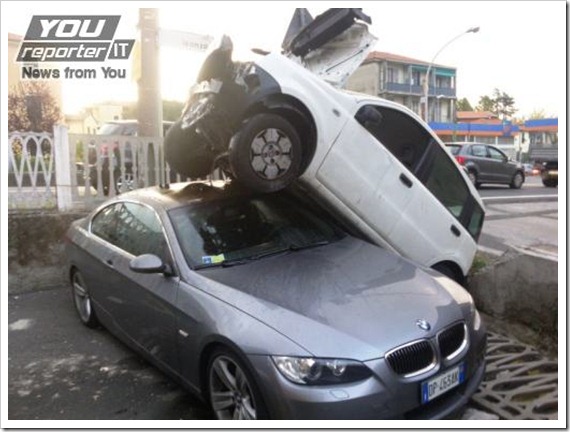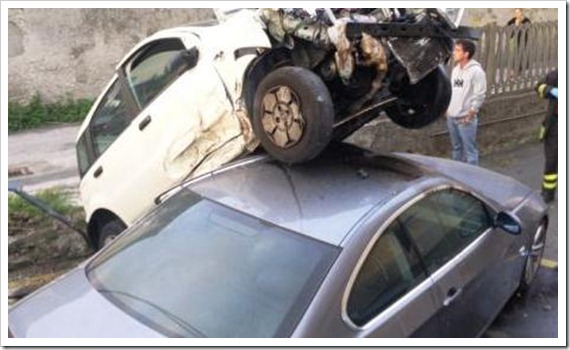Come Non Parcheggiare la Macchina Posted by Serena on Sep 14, 2011 in News
They say that in La Spezia parking spaces are at a premium. However, us Italians are famous for finding creative solutions to life’s little impediments, as you can see from the photos below!
Now here is the true story behind the photos:
Incidente incredibile questa mattina a La Spezia in prossimità della rotonda tra Via Buonviaggio e Via Fontevivo. Ore 7,40 una Fiat Panda di colore bianco condotta da un uomo di 50 anni ha urtato una Mercedes Classe A.
Incredible accident this morning in La Spezia near the roundabout between Via Buonviaggio (which ironically translates as Good Journey road!) and Via Fontevivo. 7.40 a.m., a white Fiat Panda driven by a 50 year old man crashed into a Mercedes Class A.
Dopo l’impatto ha però continuato la sua folle corsa abbattendo una recinzione in cemento fino a fermarsi sopra una BMW parcheggiata in un cortile di Via Isonzo, una traversa di Via Buonviaggio.
After the impact however, the car continued its mad race, breaking down a cement enclosure until coming to rest on top of a BMW parked in a courtyard of Via Isonzo, a road leading off Via Buonviaggio.
Una squadra dei Vigili del Fuoco ha raggiunto immediatamente il luogo del sinistro per estrarre dalla Panda l’uomo che ha causato l’incidente e per la messa in sicurezza delle auto coinvolte. I due conducenti sono stati prontamente soccorsi dal 118, mentre i rilevamenti e la dinamica dell’incidente sono in via di accertamento da parte dei Vigili Urbani. (Foto Vigili del Fuoco)
A team of firemen immediately arrived at the site of the incident to extract from the Panda the man who caused the accident, and to make safe the vehicles involved. The two drivers were promptly helped by the 118 (emergency services), whilst the surveying and dynamics of the accident are being assessed by the urban police. (Photo: Fire Brigade)
N.B. We use the word incidente when we talk about accidents: c’è stato un incidente stradale = there has been a road accident, c’è stato un incidente automobilistico = there has been a car crash.
Accidente, and its plural accidenti are used in a completely different sense: accidenti! = damn! e.g. accidenti, ho perso le mie chiavi! = damn, I’ve lost my keys! We also use the expression ‘mi è venuto un accidente’ = ‘I had a terrible shock’, gli è venuto un accidente = he had a terrible shock etc. e.g. quando ho visto il preventivo per il lavoro mi è venuto un accidente = when I saw the quote for the work I had a heart attack/terrible shock, or perhaps more appropriately: quando il proprietario della BMW ha visto una Fiat Panda parcheggiata sul tetto della sua auto gli è venuto un accidente!
You’ll also notice that the word sinistro appears in the Italian text. Apart from meaning ‘left’, sinistro is also related to the English word ‘sinister’. In legal jargon it means ‘accident’. The following quote is taken from http://english.stackexchange.com/:
Historically, the left side, and subsequently left-handedness, was considered negative in many cultures. The Latin word sinistra originally meant "left" but took on meanings of "evil" or "unlucky" by the Classical Latin era, and this double meaning survives in European derivatives of Latin, and in the English word "sinister".
Meanings gradually developed from use of these terms in the ancient languages. In many modern European languages, including English, the word for the direction "right" also means "correct" or "proper", and also stands for authority and justice.

Build vocabulary, practice pronunciation, and more with Transparent Language Online. Available anytime, anywhere, on any device.






Comments:
Jeannet:
Salve Serena,
Grazie for the ‘interesting’ accident.
Does exist the link of the quote you have given for ‘englis.stackechange.co,’ also for the italian language? Could be useful.
Jeannet
kecsia:
Hello,
it is interesting that in the Hungarian language (which is not a true European, but an oriental language), the “left” and “right” also means something like “bad” and “good”.
For example, left is “BAL” and right is “JOBB”. The word “accident” is “BALESET” in Hungarian (literally: “left event”), “BALSZERENCSE” means “misfortune” (literally: “left fortune”), and if you search for a Hungarian dictionary on the web, you can find these words too: BALLÉPÉS, BALSIKER, BALSORS, and… “BALFASZ” (sorry). But JOBB literally means not only “right”, but “better”!
Serena:
@kecsia Salve Kecsia,
yes, it’s fascinating to see how certain beliefs appear almost identical in so many different cultures and languages.
Saluti da Serena
kecsia:
Salve Serena!
If “vorrei porre una domanda” about Italian language, where can I write it? Here in a comment, or is there a forum or something like that, or have you got a public e-mail address?
Serena:
@kecsia Salve Kecsia, ti ho spedito una mail.
A presto, serena